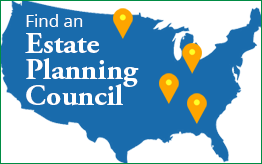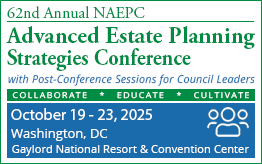Estate Planning Law Specialist Standards for Certification
A subsidiary of the National Association of Estate Planners & Councils (NAEPC)
I. Standards for Certification
- Admission to practice law
An applicant for certification shall be licensed to practice law, and must provide evidence that he or she is actively licensed and in good standing in the state of his or her primary practice. - Substantial involvement in estate planning
The applicant must have at least five years of experience as a practicing attorney. In addition, in the five years immediately preceding the filing of the application, the applicant shall have demonstrated substantial involvement in estate planning at an enhanced level of skill and expertise required for this designation. Substantial involvement is measured by the type and number of cases or matters handled by the attorney, and by the amount of time spent practicing in estate planning in the following discrete areas: planning; administration; tax; and litigation. In no event shall the proportion of time spent by the applicant be less than 40% of the applicant's normal full-time practice. Each applicant shall attest to his or her substantial involvement and shall agree to provide, if requested, such additional information and documentation necessary to verify the applicant's substantial involvement. - Continuing Legal Education
In the 36-month period prior to the date of application, the applicant must have completed at least 12 hours of continuing legal education per year in estate planning. The requirement may be fulfilled through any of the following means:- Attending programs of continuing legal education in estate planning.
- Teaching seminars or courses in estate planning.
- Participating as a panelist, speaker or workshop leader at educational or professional conferences about estate planning.
- Writing published books or articles concerning estate planning.
- Examination
The applicant must pass a comprehensive, national examination. The exam may be taken online or in hardcopy with a proctor of the applicant's choosing. The proctor must be an actively licensed attorney and cannot be related to or working within the same firm as the applicant. Specific testing information can be obtained by calling the EPLS representative at the national office telephone number below. - Favorable references from at least five colleagues
The applicant will be asked to supply the names of eight estate planning law practitioners and/or judges who are knowledgeable regarding estate planning. A majority of the references must have known the applicant for a minimum of three years. A minimum of five such individuals must provide favorable recommendation. No current partner or associate, and no one related to the applicant may be used as a reference. In addition to the names supplied by the applicant, the Board may consider references of its own choosing. The Board will ask references about their area of practice, familiarity with estate planning, the length of time they have been practicing and have known the applicant, and ask the references to opine as to the qualifications, competence and professionalism of the applicant, including information relevant to the enhanced level of skill and expertise required for this designation. - Professional liability insurance coverage
The applicant must furnish a copy of his or her professional liability insurance contract, or a certificate of coverage, with the initial application, verifying coverage with a minimum of $1,000,000 per claim. The applicant shall provide authorization for the release of information by the professional liability insurance carrier.
II. Applying for Certification
- Membership in an NAEPC affiliated local council
Membership in an affiliated local council of the NAEPC is encouraged, but not required. Certification as an Estate Planning Law Specialist by the Estate Law Specialist Board, Inc. is available to all attorneys who qualify according to the Board's stated requirements and standards. - Fees
1. Initial Fee
The Board charges the applicant fees for filing of the initial application. The one time application fee includes the applicant’s fee for sitting for the exam one time. If the applicant must re-take the examination, an additional fee will be charged. The fees for the initial application are:- Attorney who is a member of an NAEPC affiliated local council - $500.00. (A list of NAEPC affiliated local councils can be found online here.)
- Attorney who is not a member of an NAEPC affiliated local council - $600.00.
After being certified as an Estate Planning Law Specialist, the applicant must pay annual renewal fees (currently $300.00). After five years, the applicant must re-apply and a non-refundable recertification fee will be charged in order to cover reasonable administrative expenses (currently $350). These fees are non-refundable.
2. Re-Examination Fee
An applicant who fails to make a passing grade on the applicant’s first attempt at the EPLS exam, may, without reapplying, retake the exam (the second attempt) again no sooner than 90 days from the first attempt date but no later than 365 days from the first attempt date at an exam cost of $200. An applicant who fails to pass the second attempt can take the exam one additional time (the third attempt) no sooner than 90 days from the second attempt date so long as the third attempt is still within 365 days from the first attempt at a cost of $200. If an applicant fails all three attempts, the applicant must wait at least six months from the third attempt date and reapply the same as if the applicant had never applied, paying the application fee then in effect.
- Verification of information supplied by the applicant
The applicant must verify information in the application by affidavit and must sign a statement authorizing the Estate Law Specialist Board, Inc. to independently contact his or her references. In his or her application, the applicant must waive any alleged claim against the Estate Law Specialist Board, Inc. and/or its affiliated organization, NAEPC, arising out of the reference responses, the application process, and/or denial of the applicant's application for certification.
III. Maintenance of Certification
- Annual Requirements
After successful completion of the program, the Estate Planning Law Specialist must complete an annual statement verifying his or her continuation of professional liability insurance and completion of fifteen (15) hours of continuing legal education in estate planning during the preceding year. - Recertification after five years
A lawyer's certification as an Estate Planning Law Specialist is valid for five years, after which the certified attorney must re-apply for certification. The recertification process requires that the applicant demonstrate continued competence in estate planning. The applicant must demonstrate that he or she meets the same requirements of substantial involvement, peer review, educational experience and good standing, as demonstrated in the initial application. The applicant will NOT be required to take an examination. An appropriate, non-refundable, recertification fee will be charged in order to cover reasonable administrative expenses. - Suspension or revocation of certification
The Estate Planning Law Specialist's certification will be revoked or suspended if the attorney:- Is disbarred or suspended from practice of law in any jurisdiction. A certified attorney must report his or her disbarment or suspension from the practice of law to the Estate Law Specialist Board, Inc. within 30 days of such action.
- Makes a material misrepresentation in connection with an application for certification or recertification.
- Ceases to practice law in all states in which the specialist was licensed to practice law.
No suspension or revocation shall occur without notice to the certified specialist and an opportunity for a hearing.
IV. Board Authority
The Estate Law Specialist Board, Inc. shall have the sole authority to take the following actions:
- Grant certification to an applicant.
- Hear all complaints concerning a specialist and take steps to reprimand or suspend or revoke an attorney's certification.
- Review and approve organizations as approved CLE sponsors. The Board may charge a fee to the CLE organization to defray the administrative costs in reviewing and certifying such organizations; however, any organization that is recognized or registered with any state that requires mandatory CLE shall be automatically deemed to be an approved sponsor for continuing education.
- Establish rules, regulations and procedures to implement the Certification Standards.
- Establish and charge fees for application, certification, testing, recertification and annual maintenance of certification.
V. Appeal Procedure
Any lawyer applicant denied eligibility or certification will be afforded the opportunity to review (but not the confidential peer references) and appeal. The lawyer applicant must notify the Estate Law Specialist Board, Inc. in writing of his or her desire for review and appeal. The applicant must submit a written brief or memorandum in support of the lawyer's position within 90 days of the date of the lawyer's receipt of denial of the lawyer's application for certification. The review and appeal will be decided within six months by the affirmative vote of the Appeals Panel, which shall consist of at least three members of the Estate Law Specialist Board, Inc., all of whom did not participate in the review of the applicant's application. The Review Panel shall decide whether to overrule the initial denial of certification after full and thorough consideration of the applicant’s brief and any other additional information obtained. The lawyer will be advised in writing within 60 days of the action and decision by the Appeals Panel.
VI. Communicating Certification Status
Successful applicants who are awarded Board-certification by the Estate Law Specialist Board, Inc. shall be responsible for determining the rules in their state(s) of practice regarding informing others of their status as a Board-certified Estate Planning Law Specialist. In no event shall an attorney who is Board-certified state or imply that he or she is accredited by the American Bar Association. Accreditation of the Estate Law Specialist Board, Inc. by the American Bar Association indicates solely that such Board has met the American Bar Association's standards for accrediting such organizations.
The Estate Law Specialist Board, Inc. and its affiliated organization, the National Association of Estate Planners & Councils, does not discriminate against lawyers seeking certification on the basis of race, religion, gender, sexual orientation, disability or age.




